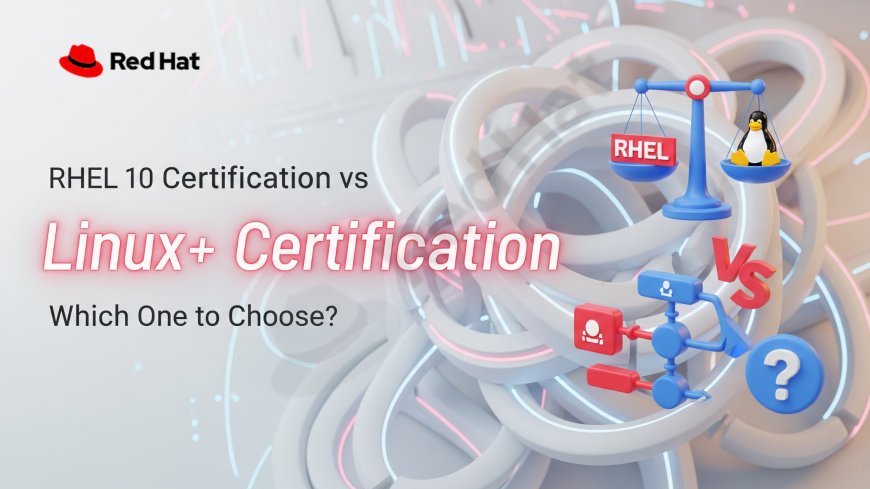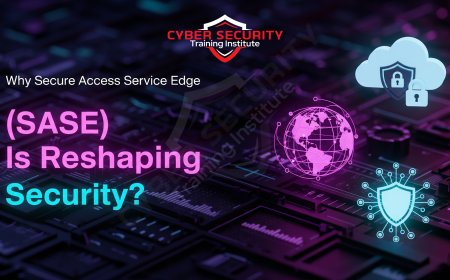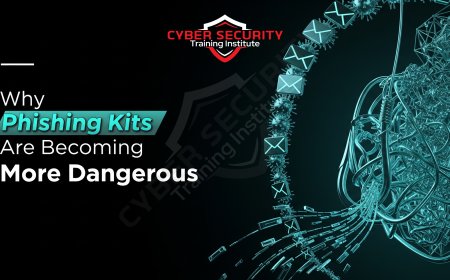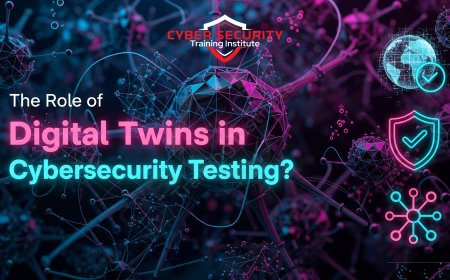RHEL 10 Certification vs Linux+ Certification: Which One to Choose?
For any IT professional looking to validate their Linux skills, a major decision looms: pursue the vendor-neutral CompTIA Linux+ or the enterprise-focused Red Hat Certified System Administrator (RHCSA)? This in-depth guide provides a comprehensive breakdown of both certifications to help you choose the right path for your career. We explore the core philosophies, the target audiences, and, most importantly, the vastly different exam formats of each credential. Discover the key distinction between the knowledge-based, multiple-choice format of the Linux+ and the rigorous, 100% hands-on, performance-based lab of the RHCSA. The piece features a detailed comparative analysis that directly contrasts the two certifications across key aspects like industry recognition, skill validation, and the ideal candidate for each. We also provide clear, actionable advice on which certification to choose based on your specific career goals, whether you are a complete beginner or an experienced professional looking to work in the enterprise space. This is an essential read for anyone looking to make a strategic investment in their career by earning a respected Linux certification.

Introduction: A Fork in the Road for Linux Professionals
You're ready to prove your Linux skills, advance your career, and get certified. That's a fantastic decision. But as you start your journey, you'll quickly hit a major fork in the road: should you pursue a vendor-neutral certification like CompTIA's Linux+, or should you go for a powerful, vendor-specific credential like the Red Hat Certified System Administrator (RHCSA)? This is one of the most common and important questions for any aspiring Linux professional, and the answer isn't that one is universally "better" than the other. Instead, they are designed for different purposes, they validate different types of skills, and they are aimed at different career goals. The choice between an RHCSA and a Linux+ certification comes down to what you want to prove: Linux+ is an excellent, foundational certification that proves broad, theoretical knowledge, while the RHCSA is a highly respected, hands-on certification that proves deep, practical skills in the world's leading enterprise Linux distribution. This guide will take a deep dive into both to help you choose the right path for you.
Understanding CompTIA Linux+: The Vendor-Neutral Foundation
CompTIA is a non-profit trade association that issues professional, and most importantly, "vendor-neutral" IT certifications. The goal of the Linux+ certification is to prove that you have the foundational knowledge and skills to work as a junior-level Linux administrator in any environment, regardless of the specific Linux distribution. It covers the common ground shared by all major Linux families, including Debian, Ubuntu, SUSE, and, of course, Red Hat.
The exam format is primarily a multiple-choice test, combined with some performance-based questions where you might need to fill in the blanks for a specific command. It is designed to test your knowledge of key Linux concepts, such as system architecture, GNU and Unix commands, filesystems, and scripting. It's a fantastic way to build and validate a broad, foundational understanding of the entire Linux ecosystem. It proves that you "know" the material from the textbook. .
Understanding RHCSA: The Enterprise Standard
Red Hat is the world's leading provider of enterprise open-source solutions, and their flagship product, Red Hat Enterprise Linux (RHEL), is the dominant operating system in corporate data centers and cloud environments worldwide. The Red Hat Certified System Administrator (RHCSA) certification is, therefore, vendor-specific. Its goal is to prove that you have the deep, practical, hands-on skills required to be a competent and professional system administrator for RHEL itself.
The exam format is the key differentiator: it is a 100% performance-based, hands-on lab exam. There are no multiple-choice questions. You are given a live, running RHEL system and a list of real-world administrative tasks that you must complete in a few hours. It tests your ability to actually do the job under pressure. It covers deep knowledge of RHEL-specific system administration, including storage management, advanced user and security controls like SELinux, and container management with Podman. .
The Key Differentiator: "Knowing" vs. "Doing"
The most important difference between the two certifications comes down to a simple concept: "knowing" versus "doing."
- The CompTIA Linux+ exam is designed to verify your knowledge. It asks you questions like, "What is the command to do X?" or "Which of these configuration files controls Y?" It is an excellent validation that you have studied and learned the broad concepts of the Linux world.
- The Red Hat RHCSA exam is designed to verify your ability. It does not ask you what the command is; it gives you a broken system and a simple instruction: "Configure the system to do X." It is an uncompromising validation of your practical ability to perform the real-world job of a system administrator in a time-pressured environment.
A simple analogy is getting a driver's license. The Linux+ is like the written, multiple-choice test you take in an office. The RHCSA is the practical, on-the-road driving test with an instructor watching your every move. You need to pass the written test to get a license, but it's the practical test that truly proves you can actually and safely drive the car.
Comparative Analysis: RHCSA vs. Linux+
The two certifications are designed for different audiences and are recognized for different strengths in the IT industry.
| Aspect | CompTIA Linux+ | Red Hat Certified System Administrator (RHCSA) |
|---|---|---|
| Focus | Is Vendor-Neutral. It covers the common skills that are applicable to a wide range of Linux distributions, including Debian, SUSE, and RHEL. | Is Vendor-Specific. It focuses exclusively and deeply on the administration of Red Hat Enterprise Linux and its ecosystem. |
| Exam Format | Is primarily a multiple-choice and fill-in-the-blank exam. It is designed to test your breadth of theoretical knowledge. | Is a 100% hands-on, performance-based lab exam. It is designed to test your depth of practical, real-world ability. |
| Industry Recognition | Is very well-respected as a foundational, entry-level certification. It is often requested for helpdesk or junior administrator roles. | Is widely considered the "gold standard" for enterprise Linux. It is highly respected and often required for mid-to-senior level system administrator and cloud engineering roles. |
| Skill Validation | Proves that you "know" a broad range of general Linux concepts and commands. | Proves that you can "do" specific, real-world administrative tasks on a live, enterprise-grade system. |
| Ideal Candidate | Is perfect for someone who is brand new to the world of Linux, or someone in a role that requires supporting many different types of Linux distributions. | Is ideal for someone who wants to work in a corporate enterprise, data center, or cloud environment, which is the primary market for RHEL. |
Making the Right Choice for Your Career Path
So, which one is right for you? The answer depends entirely on your current situation and your future career goals.
You should choose the CompTIA Linux+ if:
- You are brand new to the world of IT and Linux and you need a structured path to build a strong, broad foundation of knowledge.
- Your current or desired job requires you to work with a wide variety of different Linux distributions, such as in a web hosting company or a diverse managed service provider.
- You are aiming for an entry-level role, like IT support or a junior system administrator, and you want a respected credential that validates your foundational knowledge.
You should choose the Red Hat RHCSA if:
- You want to work in a corporate enterprise, data center, or cloud environment, where RHEL is the dominant operating system.
- Your specific career goal is to become a professional Linux System Administrator, a Cloud Engineer, or a DevOps Engineer.
- You already have some basic Linux knowledge and you want to prove to employers that you have the deep, practical, hands-on skills that they are looking for.
Finally, it's important to remember that these are not mutually exclusive. A very common and powerful career path is to start with the Linux+ to build your foundational knowledge across the ecosystem, and then to move on to the RHCSA to prove your practical, enterprise-ready mastery.
Conclusion: Choosing Your Path to Mastery
The choice between the CompTIA Linux+ and the Red Hat RHCSA is a strategic one that should be based on your individual career goals. The Linux+ is a fantastic certification that provides a broad, vendor-neutral validation of your foundational Linux knowledge—the "what." The RHCSA, on the other hand, is a rigorous, performance-based validation of your deep, practical, hands-on skill in the specific environment where most enterprise jobs exist—the "how."
While both are valuable credentials that will benefit your career, for those professionals who are aiming for a long and successful career in the demanding world of enterprise IT, the hands-on, performance-based validation of the RHCSA is often seen as the more powerful and career-accelerating certification. Choose the path that best aligns with your goals, commit to the hands-on practice, and you will be well on your way to becoming a respected Linux professional.
Frequently Asked Questions
What is Linux+?
CompTIA Linux+ is a vendor-neutral certification that validates the foundational skills and knowledge required of a junior Linux administrator. It covers a broad range of Linux distributions.
What is RHCSA?
RHCSA stands for Red Hat Certified System Administrator. It is a vendor-specific, performance-based certification that validates the core, hands-on skills required to administer a Red Hat Enterprise Linux system.
Which certification is harder?
Most professionals would agree that the RHCSA is a significantly harder exam. Its 100% hands-on, performance-based format is very challenging and requires a deep level of practical skill, whereas the Linux+ is primarily a knowledge-based, multiple-choice exam.
Which certification costs more?
The exam costs are often comparable, but this can vary by region and training partner. The official training courses for Red Hat certifications are typically more expensive than those for CompTIA certifications.
Do I need Linux+ to get the RHCSA?
No. There is no prerequisite to take the RHCSA exam. The Linux+ is a good foundational step, but it is not a requirement.
Which one is better for a complete beginner?
For a complete beginner with no prior IT experience, the CompTIA Linux+ is often recommended as a better starting point because it covers the foundational, theoretical knowledge in a more structured way.
What does "vendor-neutral" mean?
A vendor-neutral certification is one that is not tied to a specific company's product. It teaches skills and concepts that are applicable across a wide range of different vendors and technologies.
What does "performance-based" mean?
A performance-based exam is a hands-on, practical test. Instead of answering questions, you are given a live system and you must successfully complete a series of real-world tasks to pass.
Why is RHEL so popular in enterprises?
Because of its reputation for stability, its strong security features (like SELinux), and, most importantly, the world-class, long-term commercial support that Red Hat provides to its enterprise customers.
Will an RHCSA help me get a job working with Ubuntu?
While the skills are largely transferable, if a job is specifically for managing Ubuntu servers, an employer might prefer a different certification (like the LPI) or simply demonstrated experience. However, the RHCSA is so well-respected that it is valued even in non-Red Hat environments.
What is a "Linux distribution"?
A Linux distribution (or "distro") is a complete operating system that is built on top of the Linux kernel. RHEL, Ubuntu, Debian, and SUSE are all examples of different Linux distributions.
What is a "hands-on lab"?
This is another term for a performance-based exam. It refers to the exam environment where you are working on live, running computer systems.
Do these certifications expire?
Yes. The CompTIA Linux+ is valid for three years and can be renewed. The Red Hat certifications are also current for three years.
What does SELinux stand for?
SELinux stands for Security-Enhanced Linux. It is an advanced, mandatory access control system that is a core security feature of RHEL. A deep understanding of SELinux is required for the RHCSA exam.
What is Podman?
Podman is a container engine for running and managing containers on a Linux system. It is Red Hat's primary container tool, and a basic understanding of it is now part of the RHCSA.
Which certification is more recognized?
Both are highly recognized. CompTIA is a household name for foundational IT certifications. Red Hat is the undisputed leader in the enterprise Linux space, and the RHCSA is considered the premier certification within that specific, high-value domain.
Can I study for the RHCSA with CentOS Stream or Fedora?
Yes. CentOS Stream and Fedora are the upstream, community versions of RHEL. They are excellent, free platforms for practicing the skills needed for the RHCSA exam, as the core commands and tools are very similar.
What is a "junior" vs. a "senior" admin role?
A junior administrator is typically an entry-level position focused on day-to-day tasks. A senior administrator or an engineer is a more experienced role that involves more complex problem-solving, architecture, and automation, which is what the RHCE is geared towards.
Should I get the RHCE (Red Hat Certified Engineer) too?
If your career goal is to move into DevOps, cloud engineering, or a senior administrator role, then yes, the RHCE, with its focus on Ansible automation, is the essential next step after you have earned your RHCSA.
What is the ultimate deciding factor?
The ultimate deciding factor is your career goal. If you want a broad, general foundation, choose Linux+. If you want to prove you have the specific, practical skills to work in the high-stakes world of enterprise IT, the RHCSA is the clear choice.
What's Your Reaction?
 Like
0
Like
0
 Dislike
0
Dislike
0
 Love
0
Love
0
 Funny
0
Funny
0
 Angry
0
Angry
0
 Sad
0
Sad
0
 Wow
0
Wow
0















